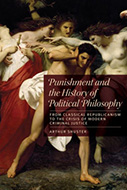Punishment and the History of Political Philosophy: From Classical Republicanism to the Crisis of Modern Criminal Justice

Author: Arthur Shuster
Publisher: Toronto: University of Toronto Press, 2016. 180p.
Reviewers: Megan Travers and Brandon Dulisse | July 2017
While it is quite common for both everyday citizens and qualified experts to debate the workings of criminal justice systems, these discussions are often limited to policy and procedure. What is often missing, however, are the equally important moral arguments that justify and serve as the foundation for such policies. With Punishment and the History of Political Philosophy, Arthur Shuster pens an intriguing interpretation of historical philosophical texts and their potential application to the issues faced today in the modern criminal justice system.
The first chapter, aptly titled “Punishment and Reform in Plato’s Laws”, analyzes the Classical Greek philosopher’s suggestions and thoughts on criminal law through a review of his philosophical musings. This section, including both Plato’s “Laws” and Shuster’s analysis, works under the premise that the singular purpose of laws is to govern citizens, and should be respected as superior. This political philosophy, also known as republicanism, emphasizes that the legitimacy of government is evidenced by the successful persuasion of the citizenry to voluntarily abide by laws, under which all citizens have equal protection, rather than by the coercing of submission. Shuster maintains a central focus on the “Stranger” (the character through whom Plato communicates his ideas), and his attempts to explicate his views on justice, criminal law, and punishment to a foreigner. During the course of this explanation, Shuster arranges these ideas by abiding to a repeated format, in which he first summarizes and quotes parts of “Laws,” provides his own interpretation, presents questions both directly from the text and of his own, and then attempts to answer said questions, which he does in a manner that allows someone not trained in classical philosophy to fully comprehend.
“Modern Natural Right and Punishment in Hobbes’ Leviathan,” the second chapter of the book, focuses almost entirely on the philosophy of punishment in the context of natural rights. Natural rights can be defined as basic universal rights that apply to everybody under all circumstances. As Shuster states, punishment by itself is a crucial topic in the criminal justice system because “the limits of the government’s right to punish serve to define the boundary separating arbitrary violence from legitimate political authority over naturally free individuals” (p.51). Shuster’s analysis of Hobbes’ Leviathan is particularly notable because of its relevance to today’s society, as the concepts discussed within are more easily applied to contemporary issues, such as the morality of capital punishment. In the original writing, Hobbes repeatedly made clear that he favored deterrence over retributive punishment, arguing that it is not only more effective at preventing future crime, but more humane as well. In his analysis, Shuster does well to point out that the dissemination of this philosophy marked a turning point in criminological and penal history, as it acknowledged the rights of and the moral treatment of the offender, which is presently a nuanced and often debated topic. Although Shuster believes that Hobbes’s theory ultimately fails due to self-contradiction, many parts of Leviathan are still relevant to the ongoing topics of rights and punishments in society today.
The third chapter presents the author’s dissection of the writings of two historically prominent philosophers: Montesquieu and Cesare Beccaria. The first portion of this chapter, titled “Liberalizing the Criminal Law,” focuses on Montesquieu’s beliefs regarding politics and criminal law and how they can be compared to the stances of Hobbes and Locke .Shuster explains how Montesquieu supposes that protection of individual rights and freedoms is paramount to maintaining a just society, and that government should never rely on the instillation of fear to control its people, but rather it should “cultivate mild mores in order to lessen criminal behavior” (p. 76). He bases this proclamation on his strong belief that citizens are malleable when part of a larger society, suggesting that they mold their behavior around that of their peers. The latter portion of this chapter introduces Cesare Beccaria, who, in his treatise “On Crimes and Punishments,” popularized many of Montesquieu’s ideas. Although much of Beccaria’s work in this edition follows the views of Montesquieu, he does introduce the idea of justifying the right of society to punish according to the social contract of liberal theory, in which he famously argues against capital punishment. After a brief elaboration on Beccaria’s liberalized penal code, Shuster turns to the historical application of both Montesquieu’s and Beccaria’s theories. Through utilizing a wider approach by combining the views of multiple philosophers, this chapter is effective not only in relaying the widely popular moral arguments developed by Montesquieu and Beccaria, but also in providing tangible examples of their executions.
Part four of Shuster’s work, titled “Retribution and Autonomy in Kant’s Rechtslehre,” aims to explain Kant’s reasoning for supporting retributive punishment rather than the more popular deterrent methods of his time. As much of Kant’s writings reflect, his partiality for retributive punishment stems from his categorical imperative, which he believes to be the foundation of all morality. In short, the categorical imperative states that all people must be treated as ends in themselves and not merely as a means to some greater objective. In accordance with this belief, anything other than proportional retributive punishment would violate the criminal’s right to fair treatment. Retributive punishment, however, ensures equality in that “whatever undeserved evil you inflict upon another…you inflict upon yourself” (p. 99). After the initial explanation of Kant’s theory, Shuster addresses two contradictions that he found: first, Kant does not believe that right and moral are identical, therefore complicating the states’ right to punish. Secondly, Kant stipulates that although an omnipotent God can know our true motivations, people cannot, thus making truly proportional retributive punishment at the hands of a human-run state impossible. Following this is Shuster’s rather lengthy but effective explanation of these issues, in which he explains how although somewhat self-contradictory, much of Kant’s theory still stands. One of the more straightforward sections of this book, Shuster’s fourth chapter provides a thorough and complete explanation of Kant’s attempt to modernize and moderate the retributive system of criminal justice.
“Foucault and the Crisis of Modern Criminal Justice,” the fifth and final chapter of the book, is centered around Foucault’s cynicism about what he believes to be the shortcomings of early 20th century criminal justice models, in particular, their propensity toward leniency and mild punishment. In order to fix this, Foucault suggested that minor crimes be punished as severely as major crimes, since any act that violates the law is a threat to the preservation of society. In a detailed analysis, Shuster argues that Foucault’s harsh opinions are not meant to, nor should they be, taken literally and put into practice. Rather, they are an idea of rough guidelines aimed at restoring strict accountability and justice where the current system fails to do so. While one might be tempted to believe that Foucault would be in favor of lengthy prison sentences, Shuster contends it is in fact the opposite. Foucault believed that punishment should be proportional to the crime so that the public would have a clear view of the possibilities of punishment options for various crimes. With incarceration, however, all crimes appear equal, differentiated only by the length of the prison stay. The combination of excitement for new, advanced criminal justice technologies (prisons), and the stellar environment they created for applying other then-novel ideas (psychology, medicine, architecture), culminated in a sort of ‘perfect storm’ that quickly led to what is considered by many to be the largest crisis plaguing civil society today: mass incarceration. Following this revelation, Shuster turns to examining Foucault’s outlook for the future of the criminal justice system, which can be summarized as “bleak,” since both surmise that an abrupt change in public beliefs, and subsequently criminal justice legislation, is highly unlikely due to many citizens staunch beliefs that incarcerating all criminals contributes to the betterment of society. Shuster’s analysis of Foucault’s work provides a solid final chapter and brings a new and intriguing perspective on controversial criminal justice topics and their origins.
In writing Punishment and the History of Political Philosophy, Arthur Shuster attempts, and largely succeeds, in addressing a complex yet crucial intersection of disciplines: criminal justice, philosophy, and political science. Through providing detailed and well thought out analyses of the works of multiple philosophers and scholars throughout several historical eras and intellectual arcs, Shuster is able to capture a complete picture of the philosophical history of punishment in a largely unbiased manner. This philosophical mosaic is a great book for those looking for a modern spin on some of the most pivotal and foundational pieces that have shaped the criminal justice system and law today.
Reviewer Information: Megan Travers, student, Indiana University of Pennsylvania.
Brandon Dulisse Ph.D., Assistant Professor, Indiana University of Pennsylvania


